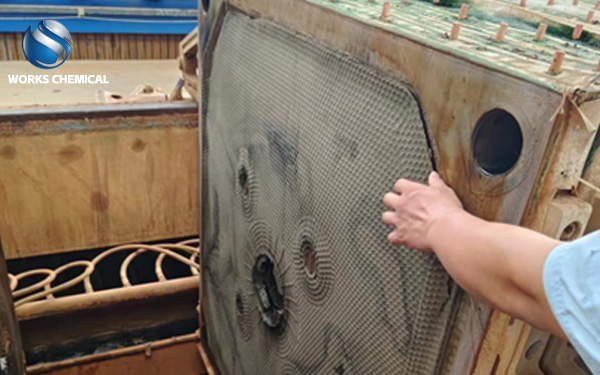
Plate and frame filter press sludge dewatering agents commonly used are mainly divided into organic and inorganic two categories, the following is a detailed introduction to these two types of agents:

A, inorganic pharmaceutical
Inorganic sludge dewatering agents mainly include polyferric aluminum chloride, polyferric sulfate, ferrous sulfate, polyaluminum chloride (PAC), basic aluminum chloride, ferric chloride and so on. Among them, iron salt is a relatively effective and cheap inorganic pharmaceutical.
Polyaluminum chloride (PAC) : has a good coagulation effect, can effectively gather the sludge particles together, improve the solid-liquid separation effect of sludge. At the same time, PAC also has a strong pH adjustment ability, which can stabilize the pH of the sewage and further improve the effect of dehydration of the board and frame.
Polyferric sulfate: can quickly form a large iron floc, increase the solid-liquid separation rate of sludge. In addition, polyferric sulfate also has good corrosion resistance and alkaline resistance, which is suitable for complex wastewater treatment environment. Compared with PAC, polyaluminum sulfate has a better phosphorus removal effect and is often selected as a dehydrating agent in wastewater treatment with high phosphorus content.
Iron salt: such as ferric chloride, is a more effective and inexpensive inorganic agent. After adding inorganic agents, the sludge concentration can be greatly accelerated and the effect of filtration dehydration can be improved. However, the amount is large, generally 5% to 20% of the absolute dry weight of the sludge, which will lead to an increase in the size of the filter cake. If ferric chloride is used as an agent, the sludge cake will corrode the equipment when burned.
Two, organic pharmaceutical
Organic sludge dewatering agents mainly include polyacrylamide, sludge conditioner and sludge synergist.
Polyacrylamide: generally used in the stack screw machine and belt filter press, the application of plate and frame filter press is relatively less.
Sludge conditioner: a new type of sludge dewatering agent, also known as sludge dewatering agent, sludge conditioning agent. It can change the surface structure of the sludge, reduce the solid surface load and the specific surface area of the sludge surface, and destroy the bacterial structure. The moisture content of the sludge can be reduced to 35%-55%, the weight reduction effect is good, and the mud pressing efficiency of the plate and frame filter press can be improved by 100%-500%, and the mud pressing cycle can be greatly shortened. At the same time, it also has the advantages of non-stick filter cloth, non-corrosive equipment, non-calcium chloride ions do not cause secondary pollution, and sludge does not increase.
Sludge enhancer: This is a multi-functional modified polymer product that can replace traditional conditioning processes during deep sludge dewatering. It can really be convenient to use, reduce energy and consumption, reduce the cost of solid waste treatment, do not change the sludge properties, have no effect on ph and organic matter, and have no side effects. It has the characteristics of multi-ability and comprehensiveness. This product can greatly improve the degree and thickness of clay cookies, and the reaction speed is fast.
In practical applications, the appropriate type of agent and dosage should be selected according to the characteristics of sludge, treatment requirements, cost budget and environmental protection requirements. At the same time, it is also necessary to pay attention to the storage stability, solubility and compatibility with other chemicals to ensure the dehydration effect of the agent and the overall efficiency of sludge treatment.